Module 10 Unit 1 I have some photos that I took in Australia last year.重点知识归纳和语法 讲解练习(含答案)
文档属性
| 名称 | Module 10 Unit 1 I have some photos that I took in Australia last year.重点知识归纳和语法 讲解练习(含答案) |
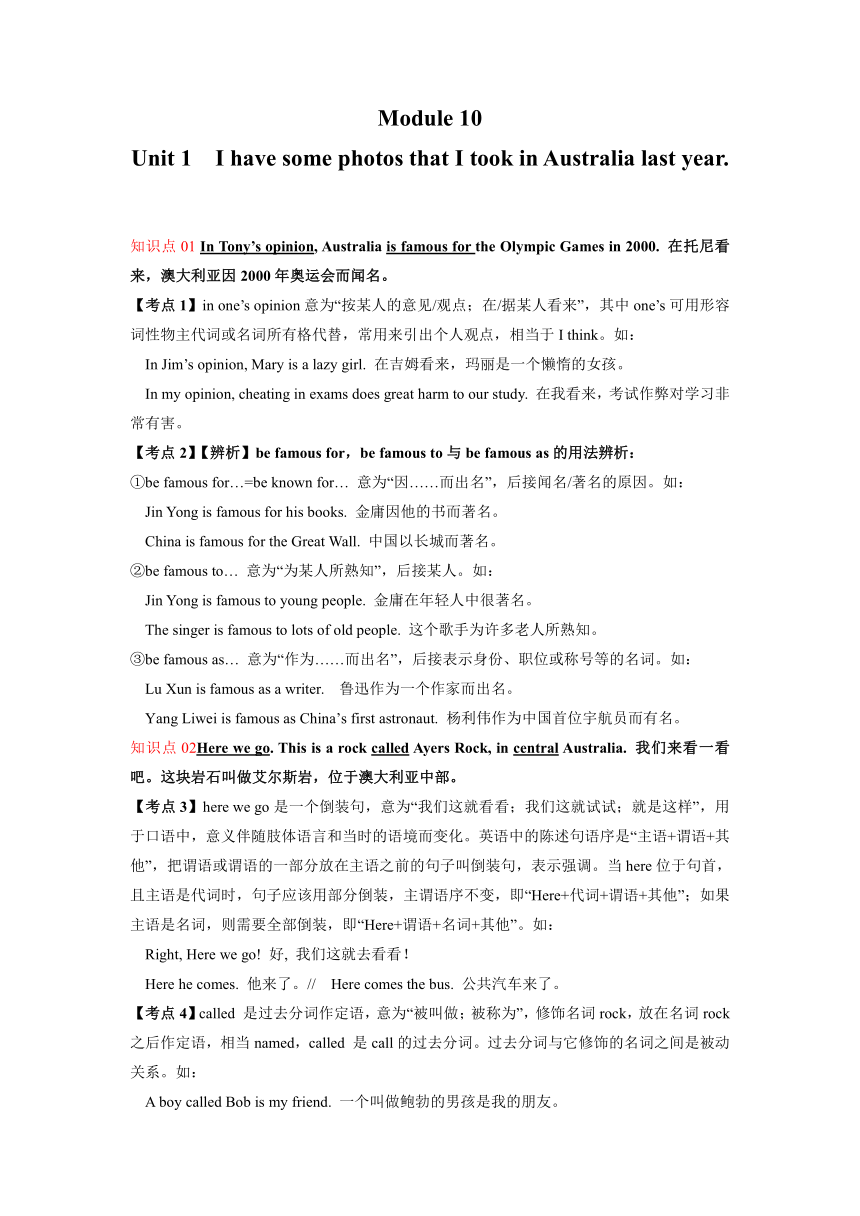
|
|
| 格式 | zip | ||
| 文件大小 | 89.5KB | ||
| 资源类型 | 教案 | ||
| 版本资源 | 外研版 | ||
| 科目 | 英语 | ||
| 更新时间 | 2023-01-17 00:00:00 | ||
图片预览

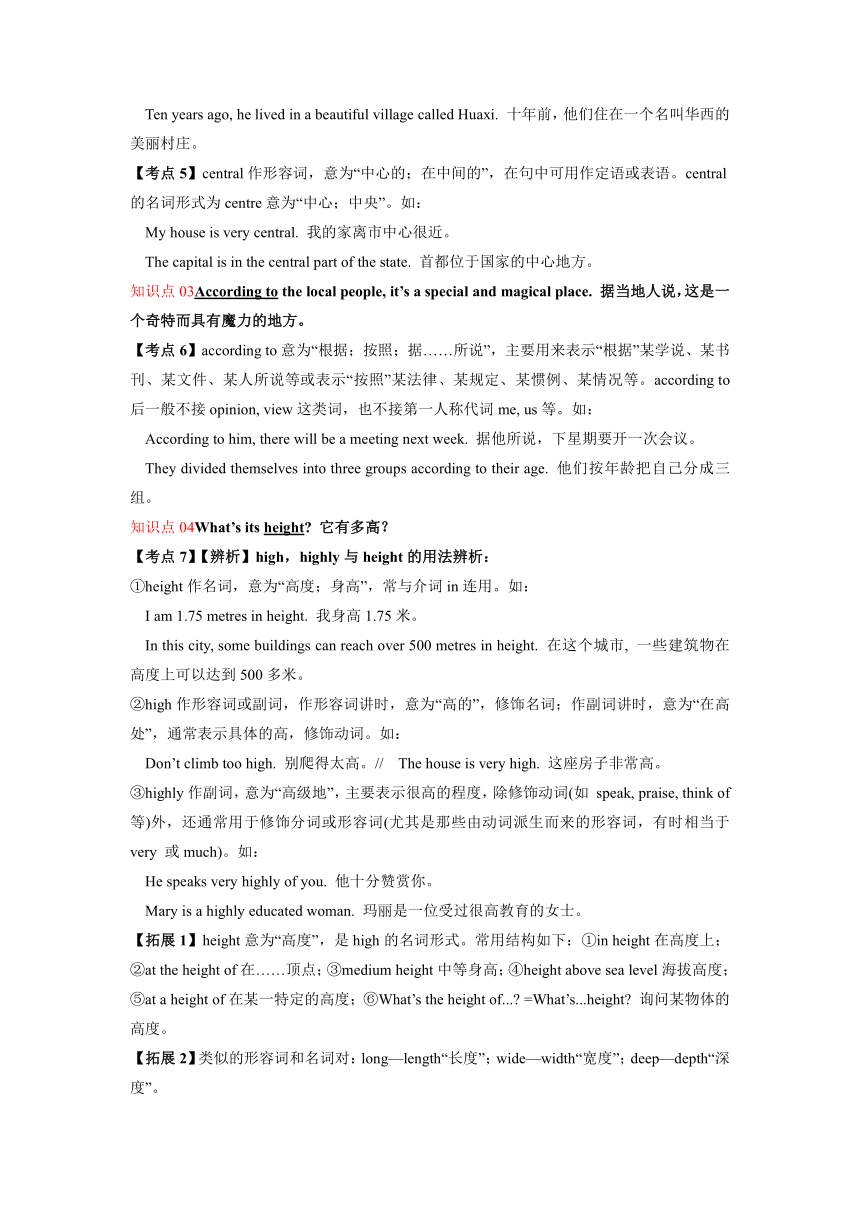
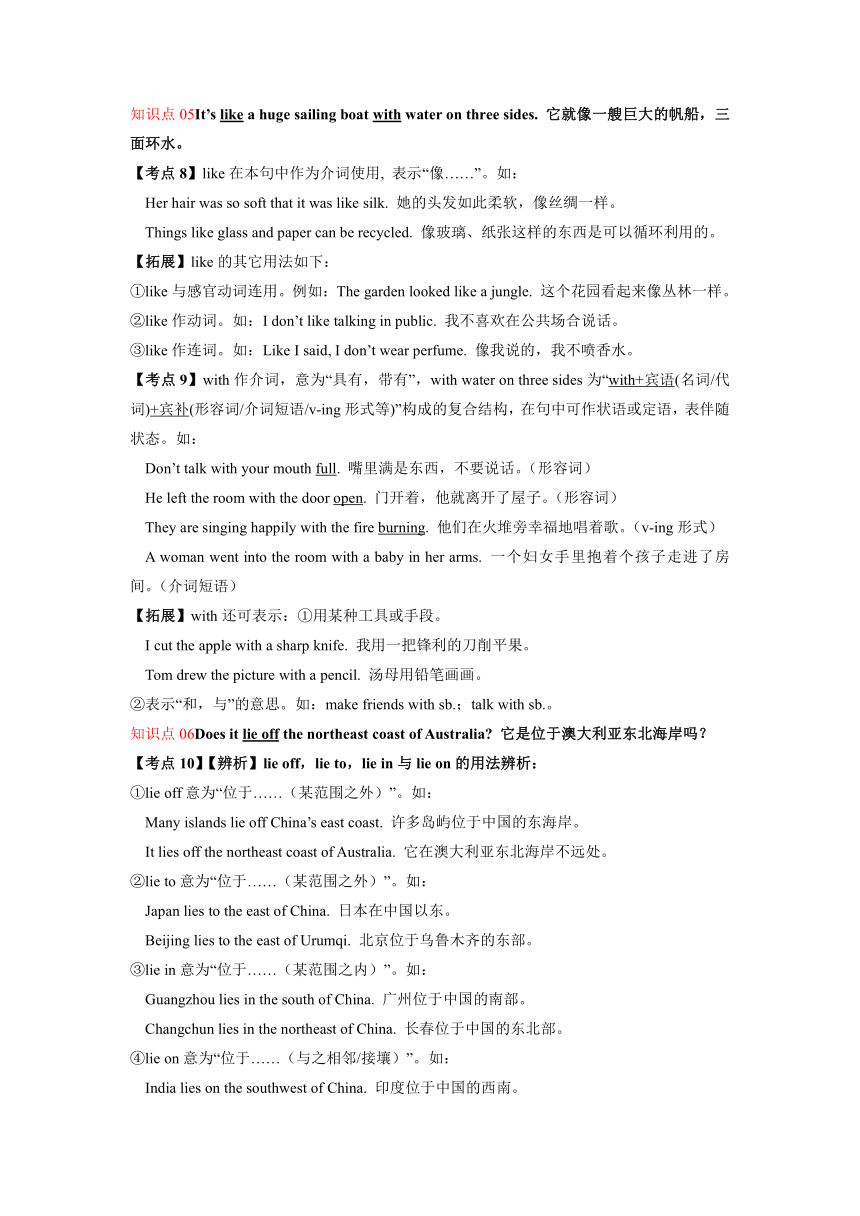
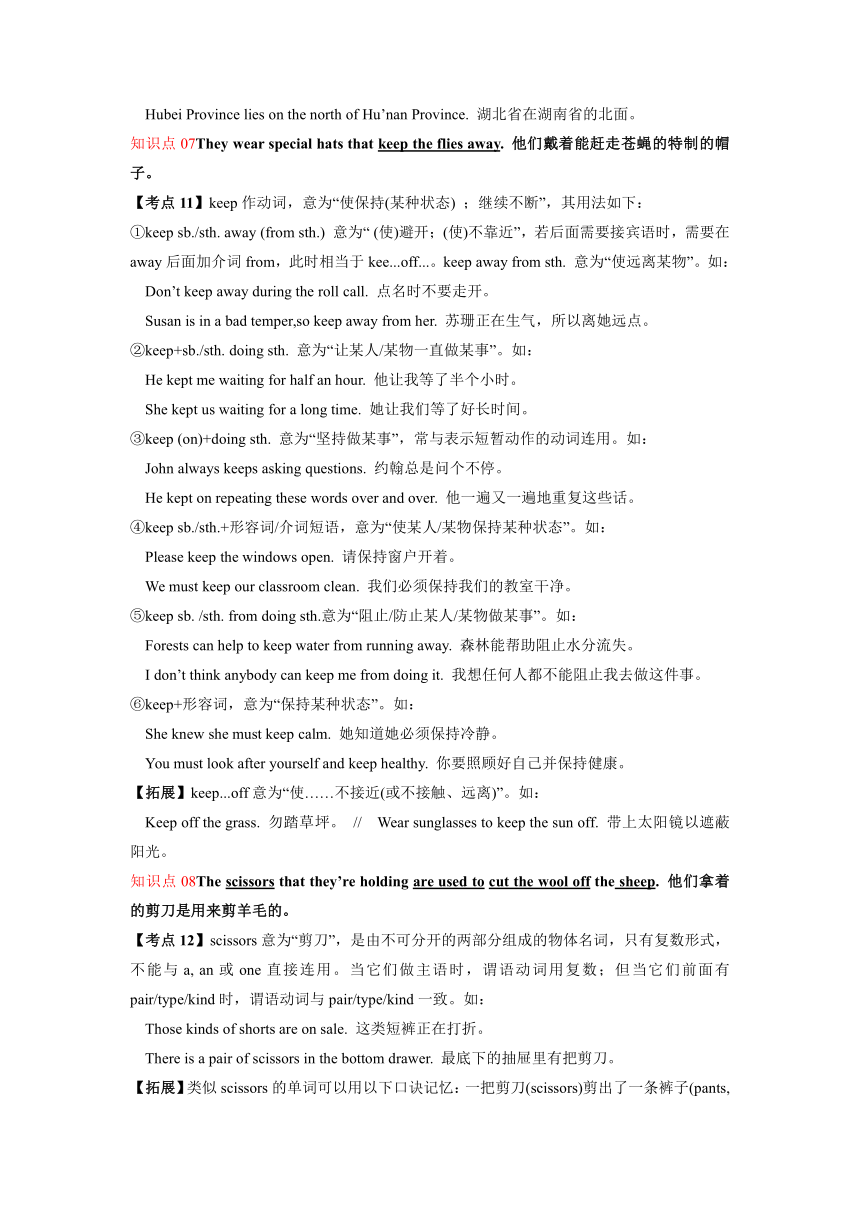
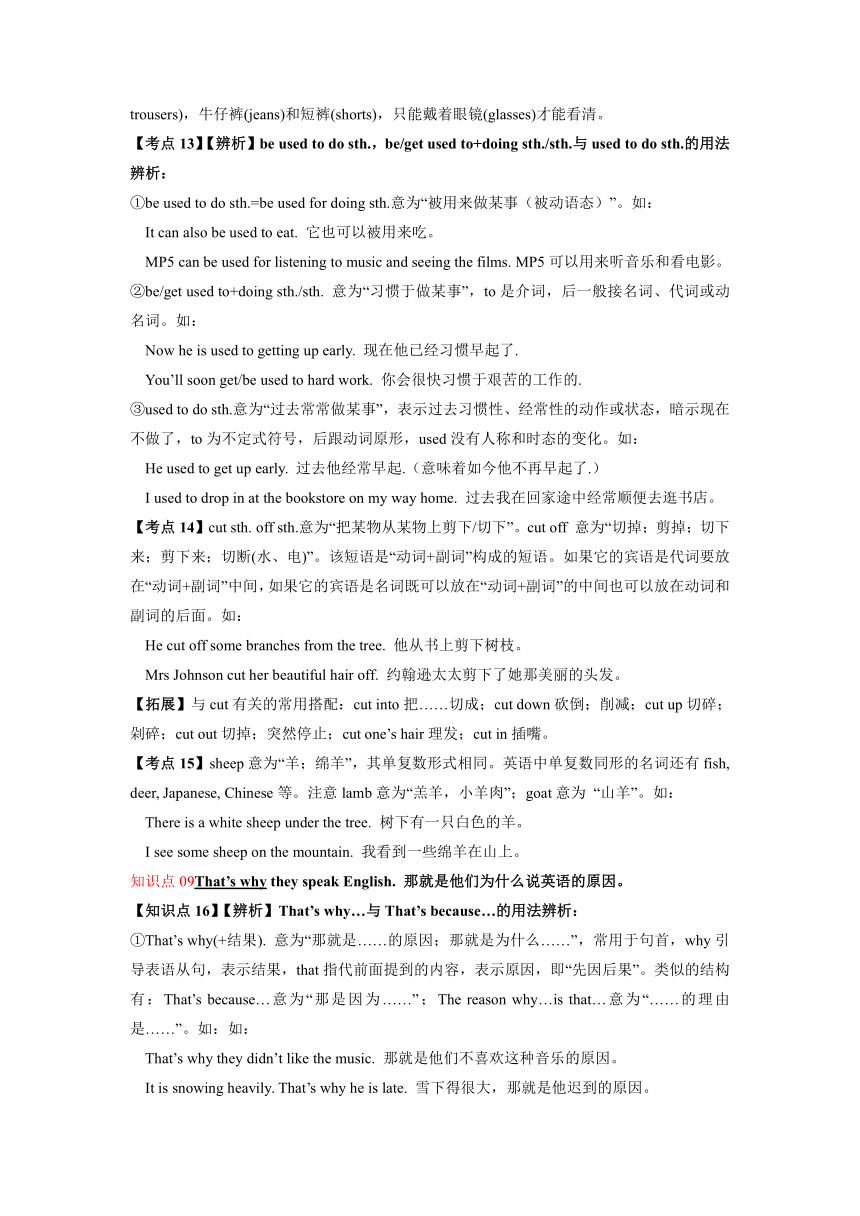
文档简介
Module 10
Unit 1 I have some photos that I took in Australia last year.
知识点01 In Tony’s opinion, Australia is famous for the Olympic Games in 2000. 在托尼看来,澳大利亚因2000年奥运会而闻名。
【考点1】in one’s opinion意为“按某人的意见/观点;在/据某人看来”,其中one’s可用形容词性物主代词或名词所有格代替,常用来引出个人观点,相当于I think。如:
In Jim’s opinion, Mary is a lazy girl. 在吉姆看来,玛丽是一个懒惰的女孩。
In my opinion, cheating in exams does great harm to our study. 在我看来,考试作弊对学习非常有害。
【考点2】【辨析】be famous for,be famous to与be famous as的用法辨析:
①be famous for…=be known for… 意为“因……而出名”,后接闻名/著名的原因。如:
Jin Yong is famous for his books. 金庸因他的书而著名。
China is famous for the Great Wall. 中国以长城而著名。
②be famous to… 意为“为某人所熟知”,后接某人。如:
Jin Yong is famous to young people. 金庸在年轻人中很著名。
The singer is famous to lots of old people. 这个歌手为许多老人所熟知。
③be famous as… 意为“作为……而出名”,后接表示身份、职位或称号等的名词。如:
Lu Xun is famous as a writer. 鲁迅作为一个作家而出名。
Yang Liwei is famous as China’s first astronaut. 杨利伟作为中国首位宇航员而有名。
知识点02Here we go. This is a rock called Ayers Rock, in central Australia. 我们来看一看吧。这块岩石叫做艾尔斯岩,位于澳大利亚中部。
【考点3】here we go是一个倒装句,意为“我们这就看看;我们这就试试;就是这样”,用于口语中,意义伴随肢体语言和当时的语境而变化。英语中的陈述句语序是“主语+谓语+其他”,把谓语或谓语的一部分放在主语之前的句子叫倒装句,表示强调。当here位于句首,且主语是代词时,句子应该用部分倒装,主谓语序不变,即“Here+代词+谓语+其他”;如果主语是名词,则需要全部倒装,即“Here+谓语+名词+其他”。如:
Right, Here we go! 好, 我们这就去看看!
Here he comes. 他来了。// Here comes the bus. 公共汽车来了。
【考点4】called 是过去分词作定语,意为“被叫做;被称为”,修饰名词rock,放在名词rock之后作定语,相当named,called 是call的过去分词。过去分词与它修饰的名词之间是被动关系。如:
A boy called Bob is my friend. 一个叫做鲍勃的男孩是我的朋友。
Ten years ago, he lived in a beautiful village called Huaxi. 十年前,他们住在一个名叫华西的美丽村庄。
【考点5】central作形容词,意为“中心的;在中间的”,在句中可用作定语或表语。central的名词形式为centre意为“中心;中央”。如:
My house is very central. 我的家离市中心很近。
The capital is in the central part of the state. 首都位于国家的中心地方。
知识点03According to the local people, it’s a special and magical place. 据当地人说,这是一个奇特而具有魔力的地方。
【考点6】according to意为“根据;按照;据……所说”,主要用来表示“根据”某学说、某书刊、某文件、某人所说等或表示“按照”某法律、某规定、某惯例、某情况等。according to后一般不接opinion, view这类词,也不接第一人称代词me, us等。如:
According to him, there will be a meeting next week. 据他所说,下星期要开一次会议。
They divided themselves into three groups according to their age. 他们按年龄把自己分成三组。
知识点04What’s its height 它有多高?
【考点7】【辨析】high,highly与height的用法辨析:
①height作名词,意为“高度;身高”,常与介词in连用。如:
I am 1.75 metres in height. 我身高1.75米。
In this city, some buildings can reach over 500 metres in height. 在这个城市, 一些建筑物在高度上可以达到500多米。
②high作形容词或副词,作形容词讲时,意为“高的”,修饰名词;作副词讲时,意为“在高处”,通常表示具体的高,修饰动词。如:
Don’t climb too high. 别爬得太高。// The house is very high. 这座房子非常高。
③highly作副词,意为“高级地”,主要表示很高的程度,除修饰动词(如 speak, praise, think of等)外,还通常用于修饰分词或形容词(尤其是那些由动词派生而来的形容词,有时相当于very 或much)。如:
He speaks very highly of you. 他十分赞赏你。
Mary is a highly educated woman. 玛丽是一位受过很高教育的女士。
【拓展1】height意为“高度”,是high的名词形式。常用结构如下:①in height在高度上;②at the height of在……顶点;③medium height中等身高;④height above sea level海拔高度;⑤at a height of在某一特定的高度;⑥What’s the height of... =What’s...height 询问某物体的高度。
【拓展2】类似的形容词和名词对:long—length“长度”;wide—width“宽度”;deep—depth“深度”。
知识点05It’s like a huge sailing boat with water on three sides. 它就像一艘巨大的帆船,三面环水。
【考点8】like在本句中作为介词使用, 表示“像……”。如:
Her hair was so soft that it was like silk. 她的头发如此柔软,像丝绸一样。
Things like glass and paper can be recycled. 像玻璃、纸张这样的东西是可以循环利用的。
【拓展】like的其它用法如下:
①like与感官动词连用。例如:The garden looked like a jungle. 这个花园看起来像丛林一样。
②like作动词。如:I don’t like talking in public. 我不喜欢在公共场合说话。
③like作连词。如:Like I said, I don’t wear perfume. 像我说的,我不喷香水。
【考点9】with作介词,意为“具有,带有”,with water on three sides为“with+宾语(名词/代词)+宾补(形容词/介词短语/v-ing形式等)”构成的复合结构,在句中可作状语或定语,表伴随状态。如:
Don’t talk with your mouth full. 嘴里满是东西,不要说话。(形容词)
He left the room with the door open. 门开着,他就离开了屋子。(形容词)
They are singing happily with the fire burning. 他们在火堆旁幸福地唱着歌。(v-ing形式)
A woman went into the room with a baby in her arms. 一个妇女手里抱着个孩子走进了房间。(介词短语)
【拓展】with还可表示:①用某种工具或手段。
I cut the apple with a sharp knife. 我用一把锋利的刀削平果。
Tom drew the picture with a pencil. 汤母用铅笔画画。
②表示“和,与”的意思。如:make friends with sb.;talk with sb.。
知识点06Does it lie off the northeast coast of Australia 它是位于澳大利亚东北海岸吗?
【考点10】【辨析】lie off,lie to,lie in与lie on的用法辨析:
①lie off意为“位于……(某范围之外)”。如:
Many islands lie off China’s east coast. 许多岛屿位于中国的东海岸。
It lies off the northeast coast of Australia. 它在澳大利亚东北海岸不远处。
②lie to意为“位于……(某范围之外)”。如:
Japan lies to the east of China. 日本在中国以东。
Beijing lies to the east of Urumqi. 北京位于乌鲁木齐的东部。
③lie in意为“位于……(某范围之内)”。如:
Guangzhou lies in the south of China. 广州位于中国的南部。
Changchun lies in the northeast of China. 长春位于中国的东北部。
④lie on意为“位于……(与之相邻/接壤)”。如:
India lies on the southwest of China. 印度位于中国的西南。
Hubei Province lies on the north of Hu’nan Province. 湖北省在湖南省的北面。
知识点07They wear special hats that keep the flies away. 他们戴着能赶走苍蝇的特制的帽子。
【考点11】keep作动词,意为“使保持(某种状态) ;继续不断”,其用法如下:
①keep sb./sth. away (from sth.) 意为“ (使)避开;(使)不靠近”,若后面需要接宾语时,需要在away后面加介词from,此时相当于kee...off...。keep away from sth. 意为“使远离某物”。如:
Don’t keep away during the roll call. 点名时不要走开。
Susan is in a bad temper,so keep away from her. 苏珊正在生气,所以离她远点。
②keep+sb./sth. doing sth. 意为“让某人/某物一直做某事”。如:
He kept me waiting for half an hour. 他让我等了半个小时。
She kept us waiting for a long time. 她让我们等了好长时间。
③keep (on)+doing sth. 意为“坚持做某事”,常与表示短暂动作的动词连用。如:
John always keeps asking questions. 约翰总是问个不停。
He kept on repeating these words over and over. 他一遍又一遍地重复这些话。
④keep sb./sth.+形容词/介词短语,意为“使某人/某物保持某种状态”。如:
Please keep the windows open. 请保持窗户开着。
We must keep our classroom clean. 我们必须保持我们的教室干净。
⑤keep sb. /sth. from doing sth.意为“阻止/防止某人/某物做某事”。如:
Forests can help to keep water from running away. 森林能帮助阻止水分流失。
I don’t think anybody can keep me from doing it. 我想任何人都不能阻止我去做这件事。
⑥keep+形容词,意为“保持某种状态”。如:
She knew she must keep calm. 她知道她必须保持冷静。
You must look after yourself and keep healthy. 你要照顾好自己并保持健康。
【拓展】keep...off意为“使……不接近(或不接触、远离)”。如:
Keep off the grass. 勿踏草坪。 // Wear sunglasses to keep the sun off. 带上太阳镜以遮蔽阳光。
知识点08The scissors that they’re holding are used to cut the wool off the sheep. 他们拿着的剪刀是用来剪羊毛的。
【考点12】scissors意为“剪刀”,是由不可分开的两部分组成的物体名词,只有复数形式,不能与a, an或one直接连用。当它们做主语时,谓语动词用复数;但当它们前面有pair/type/kind时,谓语动词与pair/type/kind一致。如:
Those kinds of shorts are on sale. 这类短裤正在打折。
There is a pair of scissors in the bottom drawer. 最底下的抽屉里有把剪刀。
【拓展】类似scissors的单词可以用以下口诀记忆:一把剪刀(scissors)剪出了一条裤子(pants, trousers),牛仔裤(jeans)和短裤(shorts),只能戴着眼镜(glasses)才能看清。
【考点13】【辨析】be used to do sth.,be/get used to+doing sth./sth.与used to do sth.的用法辨析:
①be used to do sth.=be used for doing sth.意为“被用来做某事(被动语态)”。如:
It can also be used to eat. 它也可以被用来吃。
MP5 can be used for listening to music and seeing the films. MP5可以用来听音乐和看电影。
②be/get used to+doing sth./sth. 意为“习惯于做某事”,to是介词,后一般接名词、代词或动名词。如:
Now he is used to getting up early. 现在他已经习惯早起了.
You’ll soon get/be used to hard work. 你会很快习惯于艰苦的工作的.
③used to do sth.意为“过去常常做某事”,表示过去习惯性、经常性的动作或状态,暗示现在不做了,to为不定式符号,后跟动词原形,used没有人称和时态的变化。如:
He used to get up early. 过去他经常早起.(意味着如今他不再早起了.)
I used to drop in at the bookstore on my way home. 过去我在回家途中经常顺便去逛书店。
【考点14】cut sth. off sth.意为“把某物从某物上剪下/切下”。cut off 意为“切掉;剪掉;切下来;剪下来;切断(水、电)”。该短语是“动词+副词”构成的短语。如果它的宾语是代词要放在“动词+副词”中间,如果它的宾语是名词既可以放在“动词+副词”的中间也可以放在动词和副词的后面。如:
He cut off some branches from the tree. 他从书上剪下树枝。
Mrs Johnson cut her beautiful hair off. 约翰逊太太剪下了她那美丽的头发。
【拓展】与cut有关的常用搭配:cut into把……切成;cut down砍倒;削减;cut up切碎;剁碎;cut out切掉;突然停止;cut one’s hair理发;cut in插嘴。
【考点15】sheep意为“羊;绵羊”,其单复数形式相同。英语中单复数同形的名词还有fish, deer, Japanese, Chinese等。注意lamb意为“羔羊,小羊肉”;goat意为 “山羊”。如:
There is a white sheep under the tree. 树下有一只白色的羊。
I see some sheep on the mountain. 我看到一些绵羊在山上。
知识点09That’s why they speak English. 那就是他们为什么说英语的原因。
【知识点16】【辨析】That’s why…与That’s because…的用法辨析:
①That’s why(+结果). 意为“那就是……的原因;那就是为什么……”,常用于句首,why引导表语从句,表示结果,that指代前面提到的内容,表示原因,即“先因后果”。类似的结构有:That’s because…意为“那是因为……”;The reason why…is that…意为“……的理由是……”。如:如:
That’s why they didn’t like the music. 那就是他们不喜欢这种音乐的原因。
It is snowing heavily. That’s why he is late. 雪下得很大,那就是他迟到的原因。
②That’s because(+原因). 意为“那是因为……”,常用于句首,because在此引导的是表语从句,后接表示原因的句子,that指代前面提到的结果,即“先果后因”。如:
You can’t join the army. That’s because you are not old enough. 你不能参军,因为你年龄不够。
She can’t understand this passage. That’s because she is only a child. 她不懂这篇短文,那是因为她只是一个孩子。
知识点10Did you keep a diary while you were there 您在那儿的时候记日记了吗?
【考点17】keep a diary是固定短语,意为“写日记”,diary是名词,意为“日记。如:
Every day I keep a diary in English. 我每天用英语写日记。
Li Ming has a habit of keeping a diary every day. 李明有每天记日记的习惯。
知识点11I hated the ants that were all over the place. 我讨厌到处都有蚂蚁。
【考点18】hate 作及物动词,意为“憎恨;讨厌”,其反义词为:love意为“喜爱,喜欢”。hate用法如下:
①hate sb./sth. 意为“讨厌某人/某物”。如:
Jill hates Monday mornings. 吉尔讨厌星期一早晨。
I hated myself for writing that letter. 我恨自己写了那封信。
②hate doing sth. 意为“讨厌做某事”。指习惯性或经常性的动作。如:
Mary hated watching the football matches. 玛丽讨厌看足球比赛。
The boys hate doing homework on Sundays. 男孩们讨厌在每个星期天做家庭作业。
③hate to do sth. 意为“讨厌做某事”。指具体的某一次动作。如:
I like swimming but I hate to swim today. 我喜欢游泳,但我讨厌今天去游泳。
I hate to see them throwing away good food. 我讨厌看到他们把好好的食物扔掉。
【考点19】all over意为“到处;遍及各处;浑身;全部结束”。如:
He looked all over for the lost book. 他到处寻找丢失的书。
He is wet all over. 他全身湿透了。 // The game is all over. 比赛已全部结束了。
知识点12I had to brush them off my clothes, especially my trousers! 我得把它们从我衣服上掸掉,特别是裤子上。
【考点20】brush sth. off sth.意为“把某物从某物上刷掉/拂去”。brush作动词,意为“(用刷子) 刷”;brush作名词,意为“刷子”。如:
The horse brushed the flies off its back. 马把苍蝇从背上拂去。
She brushed the dust off the table cloth. 她把桌布上的灰尘拭去。
知识点13It wasn’t funny at the time! 当时可并不有趣!
【考点21】at the time意为“那时;在那段时间”。相当于at that time,常与一般过去时或过去进行时连用。如:
At the time, I was swimming with my friends. 那时我正在和我的朋友游泳。
At the time, China did not yet have nuclear weapon. 在那时,中国还未拥有核武器。
题组A 基础过关练
Ⅰ.根据句意及汉语提示完成单词
1.The (高度)of the building is 15 metres.
2.Our apartment is in the (中心的)part of the city.
3.Did you buy a (帽子)when you travelled in Australia last summer holiday
4.Helen is cutting the (羊毛)with the scissors.
5.There are many (绵羊)on the farm.
【答案】1.height2.central3.hat4.wool5.sheep
Ⅱ.用括号中所给单词的适当形式填空
1.I think China is a wonderful and (magic)country.
2.My teacher asks us (finish)homework as quickly as possible.
3.The Sydney Opera House is like a huge (sail)boat.
4.Mary hates (swim)in spring.
5.David saw some (ant)on his way to the museum.
【答案】1.magical2.to finish3.sailing4.swimming5.ants
题组B 能力提升练
A.用方框中所给单词的适当形式填空。每词仅用一次,每空一词。
1.This stone seems to have powers.
2. he was waiting for the bus,he was reading a newspaper.
3.My sister likes candies very much,but she never her teeth after eating them.
4.We hate housework but sometimes we have to do it.
5.There are so many in the kitchen.
【答案】1.magical2.While3.brushes4.doing5.flies
B.根据短文内容和括号内所给汉语意思,写出空白处各单词的正确形式(每空一词)。
My father went to Australia last year.He took many photos and kept a __6__(日记)when he was there.You want to see the photos?OK,here we go.
This is Ayers Rock in __7__(中心的)Australia.According to the local people,it's a __8__(神奇的)place.It's 348 metres in __9__(高度).This is the Sydney Opera House.Everyone is __10__(惊奇的)at its shape,for it's like a huge __11__(帆船)boat.That's the Great Barrier Reef.It lies off the __12__(东北的)coast of Australia.
See those __13__(绵羊)farmers?They wear special hats that keep the flies away.They're holding __14__(剪刀)to cut the wool off the sheep.And this photo is about an Englishman and an Australian.We all know Australians have a __15__(近的)relationship with the British.Many Australians have British relatives.
【答案】6.diary7.central8.magical9.height10.surprised11.sailing12.northeast13.sheep14.scissors15.close
题组C 培优拔尖练
From a young age, I’ve had a really deep connection with being outside. I’ve been skiing since I was eight or nine years old. I’ve been on expeditions(探险)in many places like China, Pakistan and so on. But it was in my home country, the USA, that I came closest to death.
It was April 1,2011. I was skiing in the Tetons with my friends Jeremy and Xavier, both experienced snowboarders. That day, I was the last person to ski. They were watching me from a safe area. Suddenly, I heard someone cry loudly. I turned around and saw the whole mountain start to move behind me. It was a massive avalanche(大雪崩). The kind of avalanche that destroys trees, cars, buses, even houses!Tens of thousands of tons of snow were coming straight down the mountain behind me. I felt the snow push me forward, hundreds of meters, and then cover me. It was so heavy that I couldn’t breathe. And then it pushed me forward again and up, out of the snowpack. I looked around, and for a few seconds I actually stopped being terrified. I had a moment to pause and to look at the power of the avalanche.
I looked down into the bottom of the valley(峡谷). I could see trees that were 30m tall, because I was so far away, they looked tiny to me. “OK, I’m going all the way to the bottom!”I thought. Then the snow pushed me again down the mountain another 450m. I thought the force of the snow would destroy me, it was powerful. But in the end, I felt the avalanche slow down and I just popped(蹦出)right out of the snow at the bottom of the valley.
It took Jeremy and Xavier about 20 minutes to reach me. There was a pile of debris(碎片)across the bottom of the mountain 300m wide. They couldn’t believe it when they saw me. I was so lucky.
Has the experience changed me Do I think about life differently I don’t know, maybe. But I do know that it’s important to live your life with meaning. Life is a gift, so use it wisely.
1.What impressed the writer most in his skiing experience is .
A.the power of snow B.the sight of the valley
C.the danger of popping D.the luck of his expedition
2.The underlined word “they” refers to .
A.the mountains B.the trees
C.Jeremy and Xavier D.piles of debris
3.From the passage, it’s true that .
A.the writer came closest to death when he skied in Pakistan
B.the avalanche pushed the writer down about 300m away
C.the writer’s friends watched him at the bottom of the valley
D.the writer couldn’t breathe because of the weight of the snow
4.The writer was thrown out of the snow when .
A.his friends reached for him
B.he was pushed to the bottom
C.the avalanche started to slow down
D.the snow drove him forward again
5.According to the writer, .
A.his experience and his friends have changed him
B.it’s impossible to know the force of snow
C.one should not live a meaningless life
D.he doesn’t mind the matter of life or death
1.【答案】A
【解析】细节理解题。题干询问在作者滑雪的经历中,令作者印象最深刻的是什么。根据第二段最后一句I had a moment to pause and to look at the power of the avalanche.可知,A项“雪的力量”与题干相符,故答案为A项。本题干扰项为D项“探险的幸运”,作者遇险能脱险很幸运,但幸运并不是令作者印象最深刻的事情。
2.【答案】B
【解析】推理判断题。题干询问画线单词“they”指的是什么。they为代词,起指代上文避免重复的作用,根据第三段第二句(我可以看到30米高的树,因为我离得远,所以对我来说,它们看起来很小)可知,指的是树,故答案为B项。
3.【答案】D
【解析】细节理解题。题干询问根据文章,什么是正确的。根据第二段中的It was so heavy that I couldn t breathe.可知,D项“由于雪的重量,作者无法呼吸”与句意一致,故答案为D项。根据第一段最后一句(但是,在我的家乡美国,我离死亡最近)可知A项与原文不符;B项“大雪崩把作者往下推了大约300米远”,根据第三段第四句(然后,沿着山脉,雪又往下推了我450米)可知,数字有误,犯了信息混淆的错误;C项“作者的朋友在谷底看到了他”,根据第四段第二、三句(在300米宽的山脚下,有一堆碎片,当他们看到我时,他们都无法相信)可知,作者的朋友是在山脚下而非在谷底看到他的,因此错误。
4.【答案】B
【解析】细节理解题。题干询问什么时候作者被抛出雪堆。根据第三段最后一句(但是在最后,我感觉雪崩减慢了速度,我正好从峡谷底部的雪堆中蹦出)可知,B项“他被推到谷底”与句意一致,故答案为B项。根据第四段第二、三句可知,他的朋友在山脚下找到他,A项与题干不符;根据第三段最后一句可知,作者感觉雪崩减弱了,C项与原文意思不相符;D项意为“雪再一次驱赶他往前走”,根据原文可知,这发生在作者跳出雪堆之前,顺序不对。
5.【答案】C
【解析】细节理解题。根据最后一段第四、五句话(但我知道,过有意义的生活是非常重要的。生活是一份礼物,所以要明智地使用它)可知,C项“一个人不应该过毫无意义的生活”与句意一致,故答案为C项。A、B、D项均与原文内容不符。
分层提分
Unit 1 I have some photos that I took in Australia last year.
知识点01 In Tony’s opinion, Australia is famous for the Olympic Games in 2000. 在托尼看来,澳大利亚因2000年奥运会而闻名。
【考点1】in one’s opinion意为“按某人的意见/观点;在/据某人看来”,其中one’s可用形容词性物主代词或名词所有格代替,常用来引出个人观点,相当于I think。如:
In Jim’s opinion, Mary is a lazy girl. 在吉姆看来,玛丽是一个懒惰的女孩。
In my opinion, cheating in exams does great harm to our study. 在我看来,考试作弊对学习非常有害。
【考点2】【辨析】be famous for,be famous to与be famous as的用法辨析:
①be famous for…=be known for… 意为“因……而出名”,后接闻名/著名的原因。如:
Jin Yong is famous for his books. 金庸因他的书而著名。
China is famous for the Great Wall. 中国以长城而著名。
②be famous to… 意为“为某人所熟知”,后接某人。如:
Jin Yong is famous to young people. 金庸在年轻人中很著名。
The singer is famous to lots of old people. 这个歌手为许多老人所熟知。
③be famous as… 意为“作为……而出名”,后接表示身份、职位或称号等的名词。如:
Lu Xun is famous as a writer. 鲁迅作为一个作家而出名。
Yang Liwei is famous as China’s first astronaut. 杨利伟作为中国首位宇航员而有名。
知识点02Here we go. This is a rock called Ayers Rock, in central Australia. 我们来看一看吧。这块岩石叫做艾尔斯岩,位于澳大利亚中部。
【考点3】here we go是一个倒装句,意为“我们这就看看;我们这就试试;就是这样”,用于口语中,意义伴随肢体语言和当时的语境而变化。英语中的陈述句语序是“主语+谓语+其他”,把谓语或谓语的一部分放在主语之前的句子叫倒装句,表示强调。当here位于句首,且主语是代词时,句子应该用部分倒装,主谓语序不变,即“Here+代词+谓语+其他”;如果主语是名词,则需要全部倒装,即“Here+谓语+名词+其他”。如:
Right, Here we go! 好, 我们这就去看看!
Here he comes. 他来了。// Here comes the bus. 公共汽车来了。
【考点4】called 是过去分词作定语,意为“被叫做;被称为”,修饰名词rock,放在名词rock之后作定语,相当named,called 是call的过去分词。过去分词与它修饰的名词之间是被动关系。如:
A boy called Bob is my friend. 一个叫做鲍勃的男孩是我的朋友。
Ten years ago, he lived in a beautiful village called Huaxi. 十年前,他们住在一个名叫华西的美丽村庄。
【考点5】central作形容词,意为“中心的;在中间的”,在句中可用作定语或表语。central的名词形式为centre意为“中心;中央”。如:
My house is very central. 我的家离市中心很近。
The capital is in the central part of the state. 首都位于国家的中心地方。
知识点03According to the local people, it’s a special and magical place. 据当地人说,这是一个奇特而具有魔力的地方。
【考点6】according to意为“根据;按照;据……所说”,主要用来表示“根据”某学说、某书刊、某文件、某人所说等或表示“按照”某法律、某规定、某惯例、某情况等。according to后一般不接opinion, view这类词,也不接第一人称代词me, us等。如:
According to him, there will be a meeting next week. 据他所说,下星期要开一次会议。
They divided themselves into three groups according to their age. 他们按年龄把自己分成三组。
知识点04What’s its height 它有多高?
【考点7】【辨析】high,highly与height的用法辨析:
①height作名词,意为“高度;身高”,常与介词in连用。如:
I am 1.75 metres in height. 我身高1.75米。
In this city, some buildings can reach over 500 metres in height. 在这个城市, 一些建筑物在高度上可以达到500多米。
②high作形容词或副词,作形容词讲时,意为“高的”,修饰名词;作副词讲时,意为“在高处”,通常表示具体的高,修饰动词。如:
Don’t climb too high. 别爬得太高。// The house is very high. 这座房子非常高。
③highly作副词,意为“高级地”,主要表示很高的程度,除修饰动词(如 speak, praise, think of等)外,还通常用于修饰分词或形容词(尤其是那些由动词派生而来的形容词,有时相当于very 或much)。如:
He speaks very highly of you. 他十分赞赏你。
Mary is a highly educated woman. 玛丽是一位受过很高教育的女士。
【拓展1】height意为“高度”,是high的名词形式。常用结构如下:①in height在高度上;②at the height of在……顶点;③medium height中等身高;④height above sea level海拔高度;⑤at a height of在某一特定的高度;⑥What’s the height of... =What’s...height 询问某物体的高度。
【拓展2】类似的形容词和名词对:long—length“长度”;wide—width“宽度”;deep—depth“深度”。
知识点05It’s like a huge sailing boat with water on three sides. 它就像一艘巨大的帆船,三面环水。
【考点8】like在本句中作为介词使用, 表示“像……”。如:
Her hair was so soft that it was like silk. 她的头发如此柔软,像丝绸一样。
Things like glass and paper can be recycled. 像玻璃、纸张这样的东西是可以循环利用的。
【拓展】like的其它用法如下:
①like与感官动词连用。例如:The garden looked like a jungle. 这个花园看起来像丛林一样。
②like作动词。如:I don’t like talking in public. 我不喜欢在公共场合说话。
③like作连词。如:Like I said, I don’t wear perfume. 像我说的,我不喷香水。
【考点9】with作介词,意为“具有,带有”,with water on three sides为“with+宾语(名词/代词)+宾补(形容词/介词短语/v-ing形式等)”构成的复合结构,在句中可作状语或定语,表伴随状态。如:
Don’t talk with your mouth full. 嘴里满是东西,不要说话。(形容词)
He left the room with the door open. 门开着,他就离开了屋子。(形容词)
They are singing happily with the fire burning. 他们在火堆旁幸福地唱着歌。(v-ing形式)
A woman went into the room with a baby in her arms. 一个妇女手里抱着个孩子走进了房间。(介词短语)
【拓展】with还可表示:①用某种工具或手段。
I cut the apple with a sharp knife. 我用一把锋利的刀削平果。
Tom drew the picture with a pencil. 汤母用铅笔画画。
②表示“和,与”的意思。如:make friends with sb.;talk with sb.。
知识点06Does it lie off the northeast coast of Australia 它是位于澳大利亚东北海岸吗?
【考点10】【辨析】lie off,lie to,lie in与lie on的用法辨析:
①lie off意为“位于……(某范围之外)”。如:
Many islands lie off China’s east coast. 许多岛屿位于中国的东海岸。
It lies off the northeast coast of Australia. 它在澳大利亚东北海岸不远处。
②lie to意为“位于……(某范围之外)”。如:
Japan lies to the east of China. 日本在中国以东。
Beijing lies to the east of Urumqi. 北京位于乌鲁木齐的东部。
③lie in意为“位于……(某范围之内)”。如:
Guangzhou lies in the south of China. 广州位于中国的南部。
Changchun lies in the northeast of China. 长春位于中国的东北部。
④lie on意为“位于……(与之相邻/接壤)”。如:
India lies on the southwest of China. 印度位于中国的西南。
Hubei Province lies on the north of Hu’nan Province. 湖北省在湖南省的北面。
知识点07They wear special hats that keep the flies away. 他们戴着能赶走苍蝇的特制的帽子。
【考点11】keep作动词,意为“使保持(某种状态) ;继续不断”,其用法如下:
①keep sb./sth. away (from sth.) 意为“ (使)避开;(使)不靠近”,若后面需要接宾语时,需要在away后面加介词from,此时相当于kee...off...。keep away from sth. 意为“使远离某物”。如:
Don’t keep away during the roll call. 点名时不要走开。
Susan is in a bad temper,so keep away from her. 苏珊正在生气,所以离她远点。
②keep+sb./sth. doing sth. 意为“让某人/某物一直做某事”。如:
He kept me waiting for half an hour. 他让我等了半个小时。
She kept us waiting for a long time. 她让我们等了好长时间。
③keep (on)+doing sth. 意为“坚持做某事”,常与表示短暂动作的动词连用。如:
John always keeps asking questions. 约翰总是问个不停。
He kept on repeating these words over and over. 他一遍又一遍地重复这些话。
④keep sb./sth.+形容词/介词短语,意为“使某人/某物保持某种状态”。如:
Please keep the windows open. 请保持窗户开着。
We must keep our classroom clean. 我们必须保持我们的教室干净。
⑤keep sb. /sth. from doing sth.意为“阻止/防止某人/某物做某事”。如:
Forests can help to keep water from running away. 森林能帮助阻止水分流失。
I don’t think anybody can keep me from doing it. 我想任何人都不能阻止我去做这件事。
⑥keep+形容词,意为“保持某种状态”。如:
She knew she must keep calm. 她知道她必须保持冷静。
You must look after yourself and keep healthy. 你要照顾好自己并保持健康。
【拓展】keep...off意为“使……不接近(或不接触、远离)”。如:
Keep off the grass. 勿踏草坪。 // Wear sunglasses to keep the sun off. 带上太阳镜以遮蔽阳光。
知识点08The scissors that they’re holding are used to cut the wool off the sheep. 他们拿着的剪刀是用来剪羊毛的。
【考点12】scissors意为“剪刀”,是由不可分开的两部分组成的物体名词,只有复数形式,不能与a, an或one直接连用。当它们做主语时,谓语动词用复数;但当它们前面有pair/type/kind时,谓语动词与pair/type/kind一致。如:
Those kinds of shorts are on sale. 这类短裤正在打折。
There is a pair of scissors in the bottom drawer. 最底下的抽屉里有把剪刀。
【拓展】类似scissors的单词可以用以下口诀记忆:一把剪刀(scissors)剪出了一条裤子(pants, trousers),牛仔裤(jeans)和短裤(shorts),只能戴着眼镜(glasses)才能看清。
【考点13】【辨析】be used to do sth.,be/get used to+doing sth./sth.与used to do sth.的用法辨析:
①be used to do sth.=be used for doing sth.意为“被用来做某事(被动语态)”。如:
It can also be used to eat. 它也可以被用来吃。
MP5 can be used for listening to music and seeing the films. MP5可以用来听音乐和看电影。
②be/get used to+doing sth./sth. 意为“习惯于做某事”,to是介词,后一般接名词、代词或动名词。如:
Now he is used to getting up early. 现在他已经习惯早起了.
You’ll soon get/be used to hard work. 你会很快习惯于艰苦的工作的.
③used to do sth.意为“过去常常做某事”,表示过去习惯性、经常性的动作或状态,暗示现在不做了,to为不定式符号,后跟动词原形,used没有人称和时态的变化。如:
He used to get up early. 过去他经常早起.(意味着如今他不再早起了.)
I used to drop in at the bookstore on my way home. 过去我在回家途中经常顺便去逛书店。
【考点14】cut sth. off sth.意为“把某物从某物上剪下/切下”。cut off 意为“切掉;剪掉;切下来;剪下来;切断(水、电)”。该短语是“动词+副词”构成的短语。如果它的宾语是代词要放在“动词+副词”中间,如果它的宾语是名词既可以放在“动词+副词”的中间也可以放在动词和副词的后面。如:
He cut off some branches from the tree. 他从书上剪下树枝。
Mrs Johnson cut her beautiful hair off. 约翰逊太太剪下了她那美丽的头发。
【拓展】与cut有关的常用搭配:cut into把……切成;cut down砍倒;削减;cut up切碎;剁碎;cut out切掉;突然停止;cut one’s hair理发;cut in插嘴。
【考点15】sheep意为“羊;绵羊”,其单复数形式相同。英语中单复数同形的名词还有fish, deer, Japanese, Chinese等。注意lamb意为“羔羊,小羊肉”;goat意为 “山羊”。如:
There is a white sheep under the tree. 树下有一只白色的羊。
I see some sheep on the mountain. 我看到一些绵羊在山上。
知识点09That’s why they speak English. 那就是他们为什么说英语的原因。
【知识点16】【辨析】That’s why…与That’s because…的用法辨析:
①That’s why(+结果). 意为“那就是……的原因;那就是为什么……”,常用于句首,why引导表语从句,表示结果,that指代前面提到的内容,表示原因,即“先因后果”。类似的结构有:That’s because…意为“那是因为……”;The reason why…is that…意为“……的理由是……”。如:如:
That’s why they didn’t like the music. 那就是他们不喜欢这种音乐的原因。
It is snowing heavily. That’s why he is late. 雪下得很大,那就是他迟到的原因。
②That’s because(+原因). 意为“那是因为……”,常用于句首,because在此引导的是表语从句,后接表示原因的句子,that指代前面提到的结果,即“先果后因”。如:
You can’t join the army. That’s because you are not old enough. 你不能参军,因为你年龄不够。
She can’t understand this passage. That’s because she is only a child. 她不懂这篇短文,那是因为她只是一个孩子。
知识点10Did you keep a diary while you were there 您在那儿的时候记日记了吗?
【考点17】keep a diary是固定短语,意为“写日记”,diary是名词,意为“日记。如:
Every day I keep a diary in English. 我每天用英语写日记。
Li Ming has a habit of keeping a diary every day. 李明有每天记日记的习惯。
知识点11I hated the ants that were all over the place. 我讨厌到处都有蚂蚁。
【考点18】hate 作及物动词,意为“憎恨;讨厌”,其反义词为:love意为“喜爱,喜欢”。hate用法如下:
①hate sb./sth. 意为“讨厌某人/某物”。如:
Jill hates Monday mornings. 吉尔讨厌星期一早晨。
I hated myself for writing that letter. 我恨自己写了那封信。
②hate doing sth. 意为“讨厌做某事”。指习惯性或经常性的动作。如:
Mary hated watching the football matches. 玛丽讨厌看足球比赛。
The boys hate doing homework on Sundays. 男孩们讨厌在每个星期天做家庭作业。
③hate to do sth. 意为“讨厌做某事”。指具体的某一次动作。如:
I like swimming but I hate to swim today. 我喜欢游泳,但我讨厌今天去游泳。
I hate to see them throwing away good food. 我讨厌看到他们把好好的食物扔掉。
【考点19】all over意为“到处;遍及各处;浑身;全部结束”。如:
He looked all over for the lost book. 他到处寻找丢失的书。
He is wet all over. 他全身湿透了。 // The game is all over. 比赛已全部结束了。
知识点12I had to brush them off my clothes, especially my trousers! 我得把它们从我衣服上掸掉,特别是裤子上。
【考点20】brush sth. off sth.意为“把某物从某物上刷掉/拂去”。brush作动词,意为“(用刷子) 刷”;brush作名词,意为“刷子”。如:
The horse brushed the flies off its back. 马把苍蝇从背上拂去。
She brushed the dust off the table cloth. 她把桌布上的灰尘拭去。
知识点13It wasn’t funny at the time! 当时可并不有趣!
【考点21】at the time意为“那时;在那段时间”。相当于at that time,常与一般过去时或过去进行时连用。如:
At the time, I was swimming with my friends. 那时我正在和我的朋友游泳。
At the time, China did not yet have nuclear weapon. 在那时,中国还未拥有核武器。
题组A 基础过关练
Ⅰ.根据句意及汉语提示完成单词
1.The (高度)of the building is 15 metres.
2.Our apartment is in the (中心的)part of the city.
3.Did you buy a (帽子)when you travelled in Australia last summer holiday
4.Helen is cutting the (羊毛)with the scissors.
5.There are many (绵羊)on the farm.
【答案】1.height2.central3.hat4.wool5.sheep
Ⅱ.用括号中所给单词的适当形式填空
1.I think China is a wonderful and (magic)country.
2.My teacher asks us (finish)homework as quickly as possible.
3.The Sydney Opera House is like a huge (sail)boat.
4.Mary hates (swim)in spring.
5.David saw some (ant)on his way to the museum.
【答案】1.magical2.to finish3.sailing4.swimming5.ants
题组B 能力提升练
A.用方框中所给单词的适当形式填空。每词仅用一次,每空一词。
1.This stone seems to have powers.
2. he was waiting for the bus,he was reading a newspaper.
3.My sister likes candies very much,but she never her teeth after eating them.
4.We hate housework but sometimes we have to do it.
5.There are so many in the kitchen.
【答案】1.magical2.While3.brushes4.doing5.flies
B.根据短文内容和括号内所给汉语意思,写出空白处各单词的正确形式(每空一词)。
My father went to Australia last year.He took many photos and kept a __6__(日记)when he was there.You want to see the photos?OK,here we go.
This is Ayers Rock in __7__(中心的)Australia.According to the local people,it's a __8__(神奇的)place.It's 348 metres in __9__(高度).This is the Sydney Opera House.Everyone is __10__(惊奇的)at its shape,for it's like a huge __11__(帆船)boat.That's the Great Barrier Reef.It lies off the __12__(东北的)coast of Australia.
See those __13__(绵羊)farmers?They wear special hats that keep the flies away.They're holding __14__(剪刀)to cut the wool off the sheep.And this photo is about an Englishman and an Australian.We all know Australians have a __15__(近的)relationship with the British.Many Australians have British relatives.
【答案】6.diary7.central8.magical9.height10.surprised11.sailing12.northeast13.sheep14.scissors15.close
题组C 培优拔尖练
From a young age, I’ve had a really deep connection with being outside. I’ve been skiing since I was eight or nine years old. I’ve been on expeditions(探险)in many places like China, Pakistan and so on. But it was in my home country, the USA, that I came closest to death.
It was April 1,2011. I was skiing in the Tetons with my friends Jeremy and Xavier, both experienced snowboarders. That day, I was the last person to ski. They were watching me from a safe area. Suddenly, I heard someone cry loudly. I turned around and saw the whole mountain start to move behind me. It was a massive avalanche(大雪崩). The kind of avalanche that destroys trees, cars, buses, even houses!Tens of thousands of tons of snow were coming straight down the mountain behind me. I felt the snow push me forward, hundreds of meters, and then cover me. It was so heavy that I couldn’t breathe. And then it pushed me forward again and up, out of the snowpack. I looked around, and for a few seconds I actually stopped being terrified. I had a moment to pause and to look at the power of the avalanche.
I looked down into the bottom of the valley(峡谷). I could see trees that were 30m tall, because I was so far away, they looked tiny to me. “OK, I’m going all the way to the bottom!”I thought. Then the snow pushed me again down the mountain another 450m. I thought the force of the snow would destroy me, it was powerful. But in the end, I felt the avalanche slow down and I just popped(蹦出)right out of the snow at the bottom of the valley.
It took Jeremy and Xavier about 20 minutes to reach me. There was a pile of debris(碎片)across the bottom of the mountain 300m wide. They couldn’t believe it when they saw me. I was so lucky.
Has the experience changed me Do I think about life differently I don’t know, maybe. But I do know that it’s important to live your life with meaning. Life is a gift, so use it wisely.
1.What impressed the writer most in his skiing experience is .
A.the power of snow B.the sight of the valley
C.the danger of popping D.the luck of his expedition
2.The underlined word “they” refers to .
A.the mountains B.the trees
C.Jeremy and Xavier D.piles of debris
3.From the passage, it’s true that .
A.the writer came closest to death when he skied in Pakistan
B.the avalanche pushed the writer down about 300m away
C.the writer’s friends watched him at the bottom of the valley
D.the writer couldn’t breathe because of the weight of the snow
4.The writer was thrown out of the snow when .
A.his friends reached for him
B.he was pushed to the bottom
C.the avalanche started to slow down
D.the snow drove him forward again
5.According to the writer, .
A.his experience and his friends have changed him
B.it’s impossible to know the force of snow
C.one should not live a meaningless life
D.he doesn’t mind the matter of life or death
1.【答案】A
【解析】细节理解题。题干询问在作者滑雪的经历中,令作者印象最深刻的是什么。根据第二段最后一句I had a moment to pause and to look at the power of the avalanche.可知,A项“雪的力量”与题干相符,故答案为A项。本题干扰项为D项“探险的幸运”,作者遇险能脱险很幸运,但幸运并不是令作者印象最深刻的事情。
2.【答案】B
【解析】推理判断题。题干询问画线单词“they”指的是什么。they为代词,起指代上文避免重复的作用,根据第三段第二句(我可以看到30米高的树,因为我离得远,所以对我来说,它们看起来很小)可知,指的是树,故答案为B项。
3.【答案】D
【解析】细节理解题。题干询问根据文章,什么是正确的。根据第二段中的It was so heavy that I couldn t breathe.可知,D项“由于雪的重量,作者无法呼吸”与句意一致,故答案为D项。根据第一段最后一句(但是,在我的家乡美国,我离死亡最近)可知A项与原文不符;B项“大雪崩把作者往下推了大约300米远”,根据第三段第四句(然后,沿着山脉,雪又往下推了我450米)可知,数字有误,犯了信息混淆的错误;C项“作者的朋友在谷底看到了他”,根据第四段第二、三句(在300米宽的山脚下,有一堆碎片,当他们看到我时,他们都无法相信)可知,作者的朋友是在山脚下而非在谷底看到他的,因此错误。
4.【答案】B
【解析】细节理解题。题干询问什么时候作者被抛出雪堆。根据第三段最后一句(但是在最后,我感觉雪崩减慢了速度,我正好从峡谷底部的雪堆中蹦出)可知,B项“他被推到谷底”与句意一致,故答案为B项。根据第四段第二、三句可知,他的朋友在山脚下找到他,A项与题干不符;根据第三段最后一句可知,作者感觉雪崩减弱了,C项与原文意思不相符;D项意为“雪再一次驱赶他往前走”,根据原文可知,这发生在作者跳出雪堆之前,顺序不对。
5.【答案】C
【解析】细节理解题。根据最后一段第四、五句话(但我知道,过有意义的生活是非常重要的。生活是一份礼物,所以要明智地使用它)可知,C项“一个人不应该过毫无意义的生活”与句意一致,故答案为C项。A、B、D项均与原文内容不符。
分层提分
同课章节目录
- Module 1 Wonders of the world
- Unit 1 It's more than 2,000 years old.
- Unit 2 The Grand Canyon was not just big.
- Unit 3 Language in use
- Module 2 Public holidays
- Unit 1 My family always go somewhere interesting a
- Unit 2 We have celebrated the festival since the f
- Unit 3 Language in use
- Module 3 Heroes
- Unit 1 She trained hard,so she became a great play
- Unit 2There were few doctors, so he had to work ve
- Unit 3 Language in use
- Module 4 Home alone
- Unit 1 I can look after myself, although it won’t
- Unit 2 I became so bored with their orders that I
- Unit 3 Language in use
- Module 5 Museums
- Unit 1 Don't cross that rope!
- Unit 2 If you ever go to London, make sure you vis
- Unit 3 Language in use
- Module 6 Problems
- Unit 1 If I start after dinner, I'll finish it be
- Unit 2 If you tell him the truth now, you will sho
- Unit 3 Language in use
- Revision Module A
- Module 7 Great books
- Unit 1 We're still influenced by Confucius's idea
- Unit 2 It is still read and loved.
- Unit 3 Language in use
- Module 8 Sports life
- Unit 1 Daming wasn't chosen for the team last time
- Unit 2 He was invited to competitions around the w
- Unit 3 Language in use
- Module 9 Great inventions
- Unit 1 Will computers be used more than books in t
- Unit 2 Will books be replaced by the Internet?
- Unit 3 Language in use
- Module 10 Australia
- Unit 1 I have some photos that I took in Australia
- Unit 2 The game that they like most is Australian
- Unit 3 Language in use
- Module 11 Photos
- Unit 1 He's the boy who won the photo competition
- Unit 2 The photo which we liked best was taken by
- Unit 3 Language in use
- Module 12 Save our world
- Unit 1 If everyone starts to do something, the wor
- Unit 2 Repeat these three words daily: reduce, reu
- Unit 3 Language in use
- Revision Module B
